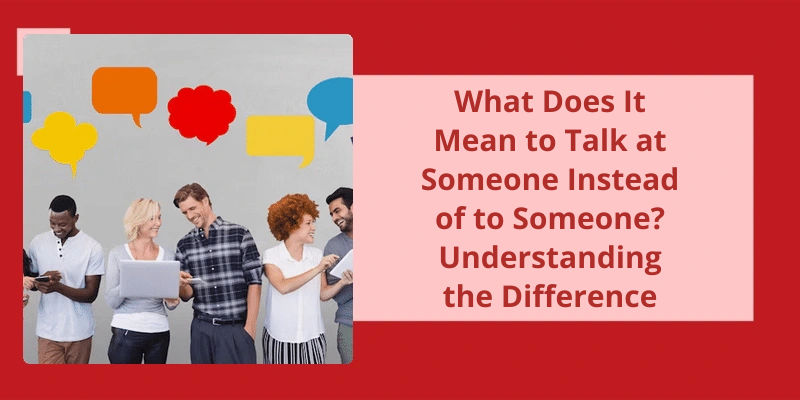The art of communication lies in the clarity and effectiveness of your words. But what happens when you find yourself in a position where you’ve to repeat information that you've already shared with someone? It's a common scenario that often leads to frustration, irritation, and sometimes, even rudeness. In such situations, the risk of saying something that could be perceived as impolite or impudent is high, and it's crucial to tread with caution. The question is, is it rude to tell someone that you’ve already told them something? The answer isn’t straightforward, and it varies depending on the context, your tone, and your body language. Read on to understand how to communicate this message clearly without sounding impolite or insensitive.
Why Is It Bad to Say I Told You So?
Theyre already dealing with the disappointment or failure theyre experiencing, and then you go and rub it in. It’s not helpful, and it won’t make them feel any better. In fact, it can have the opposite effect.
Instead of being helpful, “I told you so” can be hurtful. It comes across as condescending and dismissive of the other persons feelings and experiences. Youre not taking the time to empathize with their struggle or acknowledge the effort they put in. Youre just gloating about being right.
Furthermore, “I told you so” can damage relationships. It creates an air of superiority and arrogance, which can be off-putting to others. If you constantly rub your correctness in someones face, they may begin to feel belittled or disrespected. Over time, this can erode their trust in you and damage the relationship.
Perhaps most importantly, “I told you so” is unproductive. It’s not a helpful way to move the conversation forward. Instead of dwelling on the past and assigning blame, focus on how you can help the person in the present. Ask them how you can support them and what they need from you. Approach the situation with kindness and compassion, and youll likely find a much better outcome.
Saying “I told you so” is generally not a good idea. It can be hurtful, damaging, and unproductive. Instead of putting others down, take the opportunity to empathize with their struggles and offer support. By doing so, youll build stronger, healthier relationships and create a more positive environment for everyone involved.
Alternatives to Saying “I Told You So” That Show Empathy and Understanding.
- It’s okay, we all make mistakes.
- I understand where you were coming from.
- Don’t worry, we can work on this together.
- Thanks for trying anyway.
- It’s not the end of the world.
- Let’s figure out what we can do next.
- These things happen, let’s move forward.
- It’s understandable why you thought that.
- Mistakes are a part of learning.
Now that we’ve clarified the correct usage of “I told you”, let’s delve deeper into the implications and nuances of this commonly used phrase.
Is It Correct to Say I Told You?
This means that you’re conveying the message that someone should sit down. However, if you were to use tell instead, the sentence would be I told you to sit. In this case, the use of “I told you” is more appropriate than “I said”.
It suggests that the speaker had advised the listener against a certain action or warned them about a potential outcome, and that this advice was not heeded. By using this phrase, the speaker can communicate their frustration or disappointment with the listeners actions. It can also be used to express a sense of vindication if the warned outcome did occur.
Depending on the tone and context in which it’s used, it may imply that the speaker is taking credit for being right or that they’re placing blame on the listener for not listening to their advice. In some cases, it may be more effective to express ones displeasure in a more constructive and diplomatic manner.
In addition, the use of “I told you” can also be a way of reinforcing a power dynamic. If one person repeatedly tells another what to do or reminds them of previous advice, it can create a sense of hierarchy or dependence. This can be problematic if the advice-giver is using their position of power to manipulate or control the other person.
While it can be an effective way of expressing frustration or disappointment, it’s important to be mindful of how it may come across and to consider alternative ways of communicating ones feelings.
It’s common to feel a sense of satisfaction when something you’ve predicted comes true. However, rubbing it in someone’s face by saying “I told you so” isn’t always the best approach. Fortunately, there are other ways to convey this same sentiment without sounding dismissive. Here are some alternative phrases you can use when you feel tempted to say “I told you so.”
What Can I Say Instead of I Told You So?
When someone comes to you saying “I told you so,” it could come off as condescending and dismissive. Therefore, it’s essential to use alternatives that would convey the same message without sounding arrogant or rude. Instead of “I told you so,” try “You know, I’d a feeling that would happen.”. This phrase suggests that you’d insight into the situation, without rubbing it in their face.
Another way to avoid causing offense when making a point is by using phrases like “As I predicted” or “As I suspected.”. It conveys your foresight without gloating or being overbearing. You can also say, “I knew this would happen,” which sounds more like a statement of fact than an attempt to prove a point.
When someone doesn’t heed your advice, it can be tempting to say, “I told you that would happen.”. But instead, you can say, “I was concerned that this might be the outcome.”. This phrase signals that you were attentive to the situations potential consequences and that you were trying to help without being prescriptive.
Sometimes, people are stubborn and refuse to listen to our warnings. In such cases, it’s okay to say, “I tried to warn you,” but doing so means walking a fine line between expressing concern and casting blame. Instead of saying “I tried to warn you,” you could say, “I expressed my reservations about the situation.”. This phrase implies that you weren’t simply nagging or criticizing, but genuinely concerned.
Overall, avoiding phrases like “I told you so” depends on how we present our observations and opinions. When were mindful of others feelings, we can communicate more effectively while avoiding conflict or resentment. Saying things like “I sensed this would happen,” “I’d a feeling about this,” or “I was worried this would happen,” can help us get our point across without rubbing it in others faces.
How to Effectively Communicate Advice Without Sounding Overbearing
The key to effectively communicating advice without sounding overbearing is to first establish a rapport with the person you’re speaking with. It’s important to approach the situation with understanding and empathy, and to ask open-ended questions instead of giving unsolicited advice. It’s also important to avoid using a condescending or accusatory tone. By offering your perspective as an option rather than an order, you can effectively communicate your advice without coming across as overbearing.
When communicating with others, it’s essential to be mindful of our word choices and tone. Although some phrases may seem harmless to us, they can come across as rude or dismissive to those on the receiving end. One such phrase that often falls into this category is “as I told you.” Let’s take a closer look at why this seemingly harmless phrase can be perceived as rude and how we can communicate more effectively.
Is It Rude to Say as I Told You?
#2: In some cases, saying “as I told you” can come across as arrogant and condescending. It suggests that the speaker believes they’re superior to the listener and that their previous advice should have been heeded. This can be especially problematic in professional settings where it’s important to maintain a level of respect and collegiality between colleagues.
#3: However, there are also situations where using this phrase can be appropriate and even helpful. For example, if you’re trying to remind someone of something you’ve previously discussed, saying “as I told you” can be a useful way to provide context and remind them of the previous conversation.
#4: The key to using this phrase effectively is to be mindful of your tone and the context in which you’re speaking. If you’re speaking to someone in a position of authority or who may be sensitive to criticism, it’s better to avoid using this phrase altogether. Instead, try to rephrase your comment in a way that focuses on the information rather than the listeners actions.
#5: Overall, it’s important to remember that communication is a two-way street. While it can be frustrating to have to repeat yourself, it’s also important to listen carefully to the other person and try to understand their perspective. By approaching communication with respect and empathy, we can build stronger relationships and avoid misunderstandings.
It’s not uncommon to forget that you’ve already shared information with someone, or to have someone forget that you’ve already heard it. When that happens, it can be tricky to find the right way to politely say “I already told you.” Luckily, there are a few different phrases and approaches you can use to gently remind someone that they’ve mentioned something before. Here are some options to consider.
How Do You Politely Say I Already Told You?
When engaging in a conversation, it isn’t uncommon for individuals to repeat themselves. While this may be unintentional, it can be frustrating for the listener. When this happens, it’s important to find a way to remind them that they’ve already shared this information with you without coming across as impolite or rude. In most cases, politely saying “I already told you” may not be the best approach.
One way to communicate that the information has already been shared is to acknowledge that it’s been previously mentioned. You can say, “You previously mentioned that to me” or “Your previous statement reaffirmed that” to remind the individual that this isn’t new information. This can be a gentle reminder that you’re already aware of the topic at hand.
Another approach is to use more formal language to communicate that the information has already been shared. Saying “You previously informed me about this” or “You’ve already shared this information with me” can help to convey your message while maintaining a level of politeness. By using more formal language, you can help to diffuse any potential tension or conflict in the conversation.
In some cases, it can be helpful to redirect the conversation back to the topic at hand. For example, you could say, “Yes, we discussed this earlier. Could you tell me more about your thoughts on the matter?” or “I remember you telling me about this before. Have there been any updates or developments since then?”. This approach can help to refocus the conversation and keep it moving forward.
Ultimately, when trying to communicate that the information has already been shared, it’s important to focus on maintaining a polite and respectful tone. By using gentle reminders, formal language, redirection, and expressions of gratitude, you can help to convey your message without coming across as impolite or rude. With a little bit of tact and strategy, you can navigate these conversations with ease and grace.
Strategies for Effective Communication in Conversations
Strategies for effective communication in conversations refer to the techniques or methods that individuals can use to convey their message clearly and comprehensively while engaging in a conversation. These strategies may include active listening, using nonverbal cues, asking clarifying questions, being concise and clear, and acknowledging the other person’s perspective. Effective communication skills are crucial in building solid relationships and ensure that the conversation remains focused and productive.
Conclusion
In conclusion, communication plays a crucial role in maintaining healthy relationships. When we convey our thoughts, we must be careful about our tone and body language. Failure to do so may result in unintended consequences and might lead to strained relationships with our loved ones. Telling someone that we’ve already told them can be risky if not done appropriately. To prevent misunderstandings, always ensure that your tone and body language are positive and welcoming. Doing this won’t only create a safe environment but also encourage people to ask questions and seek clarity without fear of being judged or criticized.






